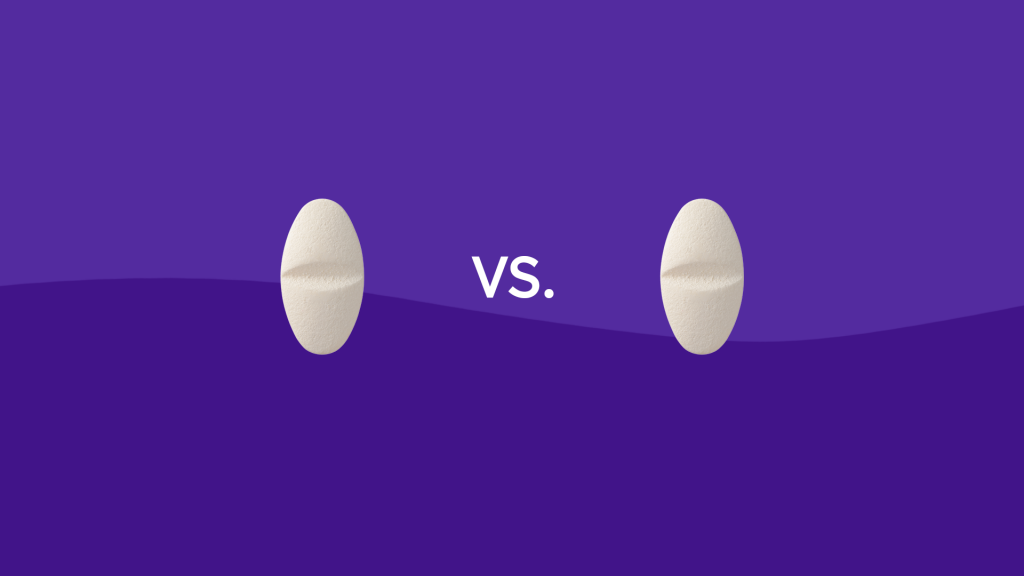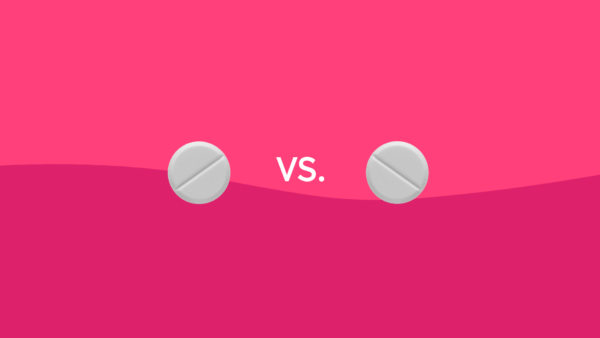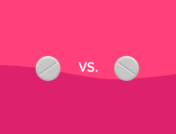Drug overview & main differences | Conditions treated | Efficacy | Insurance coverage and cost comparison | Side effects | Drug interactions | Warnings | FAQ
Insomnia is a sleep disorder that can make it difficult to fall and/or stay asleep. People with insomnia often get too little sleep, or the sleep is poor quality. According to the American Sleep Association, insomnia is the most common sleep problem. About 30% of adults experience short-term insomnia, while about 10% experience chronic insomnia that lasts a month or longer. Patients use a variety of techniques to try to improve sleep, such as taking the supplement melatonin to regulate sleep cycles, or talking to a mental health professional with cognitive behavioral therapy. However, sometimes prescription medication is needed to address sleep problems.
Belsomra and Ambien are two brand-name sleep aid medications prescribed for the treatment of insomnia. Belsomra is made by Merck, and Ambien is made by Sanofi-Aventis. Ambien also has a generic, zolpidem, which is made by various manufacturers.
Belsomra (suvorexant) is classified in a group of medicines called orexin receptor antagonists. Belsomra works by blocking the action of a substance in the brain that causes wakefulness.
Ambien (zolpidem) is classified in a group of medicines called sedative-hypnotics. Ambien works by slowing down activity in the brain to help the patient sleep.
Belsomra and Ambien are prescription drugs approved by the U.S. Food and Drug Administration (FDA). Both drugs are controlled substances, classified as Schedule IV. This means they have some potential for abuse and dependence.
Although both medications are insomnia drugs, they are not exactly the same. Continue reading to learn more about these two sleeping medications.
Related: What is Belsomra | What is Ambien
What are the main differences between Belsomra vs. Ambien
Belsomra is classified as an orexin receptor antagonist. It contains the ingredient suvorexant, but is not available as a generic at this time. Belsomra is available as an oral tablet that is taken by mouth at bedtime. Belsomra is approved in adults and is not approved in children under age 18.
Ambien is classified as a sedative-hypnotic. Ambien contains the ingredient zolpidem and is available in both brand and generic. Ambien CR contains zolpidem extended-release. Although this article focuses on Ambien, it is important to note that zolpidem is also available under various other brand names:
- Edluar (sublingual, or under the tongue, tablets)
- Intermezzo (sublingual tablets)
- Zolpimist (oral spray)
Ambien should be taken just before getting into bed, and not sooner than that. Women will start Ambien at the lowest dose of 5 mg, because Ambien clears the body slower in women. Men will start Ambien at either 5 mg or 10 mg. In those who take 5 mg, the healthcare provider may increase the dose to a maximum of 10 mg at bedtime, if needed.
The duration of treatment for Ambien varies. It is recommended to be used for short-term treatment and has been studied in clinical trials for four to five weeks. However, some healthcare providers prescribe Ambien for a longer period of time in patients who need it. Ambien is approved in adults and is not approved in children under age 18.
Main differences between Belsomra vs. Ambien |
||
|---|---|---|
| Belsomra | Ambien | |
| Drug class | Orexin receptor antagonist | Sedative-hypnotic |
| Brand/generic status | Brand | Brand and generic |
| What is the generic name? | Suvorexant (this is the ingredient—Belsomra is not available as a generic at this time) | Zolpidem |
| What form(s) does the drug come in? | Tablet (5, 10, 15, 20 mg) | Ambien: tablet (5 and 10 mg) Ambien CR: tablet (6.25 and 12.5 mg) |
| What is the standard dosage? | 10 mg dose by mouth once at night, within 30 minutes before bedtime, with at least 7 hours to sleep (the healthcare provider may increase the dose to 20 mg at bedtime if needed) *Maximum dose 20 mg |
Women: Start with 5 mg by mouth at bedtime (just before getting into bed) with at least 7-8 hours to sleep Men: Start with 5 or 10 mg by mouth at bedtime (just before getting into bed) with at least 7-8 hours to sleep *Maximum dose 10 mg |
| How long is the typical treatment? | Varies | Varies |
| Who typically uses the medication? | Adults | Adults |
Conditions treated by Belsomra and Ambien
Belsomra is used to treat insomnia. This can include people who have difficulty falling asleep and/or staying asleep. Ambien is used in people who have trouble falling asleep. Ambien CR, however, contains two layers—one layer dissolves quickly and helps patients fall asleep, while the other layer dissolves slowly to help patients stay asleep.
| Condition | Belsomra | Ambien |
| Treatment of insomnia (falling and/or staying asleep) | Yes | No (but Ambien CR is indicated for falling and/or staying asleep) |
| Treatment of insomnia (falling asleep) | Yes | Yes |
Is Belsomra or Ambien more effective?
The American Academy of Family Physicians recommends cognitive behavioral therapy (CBT) for insomnia, noting that psychological and behavioral interventions are considered first-line treatment. If CBT is not effective, then short-term medication may be considered. The FDA recommends medication should only be used for up to five weeks and should not be used for extended periods. Insomnia that does not begin to improve after seven to 10 days of medication requires further evaluation. These guidelines state that Belsomra, Ambien, and Lunesta (eszopiclone) had the strongest evidence of effectiveness. However, the guidelines do not recommend one medication over the other.
The most effective medication for a patient should only be determined by the healthcare provider, who can take into account the patient’s medical conditions, history, and other medications the patient is currently taking. It is also important to note that nonmedicinal measures can be used along with prescription drugs. For example, cognitive behavioral therapy can be a helpful tool. The Centers for Disease Control and Prevention (CDC) offers some sleep hygiene (good sleep habits) tips:
- Maintain a consistent bedtime and wake-up time on weekdays and weekends.
- Keep your bedroom a good sleep environment—dark, quiet, relaxing, and a comfortable temperature for sleeping.
- Keep electronics out of the bedroom, including televisions, computers, smartphones, and tablets.
- Do not consume large meals, caffeine, and/or alcohol before bedtime. (Always avoid alcohol if you take Belsomra or Ambien.)
- Establish a regular exercise routine.
Coverage and cost comparison of Belsomra vs. Ambien
With Belsomra, insurance and Medicare prescription coverage varies. A typical prescription of Belsomra 20 mg, 30 tablets can cost about $578 if you pay out of pocket. However, you can use a free SingleCare card and pay less than $360.
Ambien is usually covered by insurance and Medicare prescription plans, in its generic form, zolpidem. A typical prescription of brand-name Ambien 10 mg, 30 tablets can cost about $715 if you pay out-of-pocket. However, you can choose the generic version, and use a free SingleCare card to pay less than $8.
| Belsomra | Ambien | |
| Typically covered by insurance? | Coverage varies | Usually (generic), but coverage varies |
| Typically covered by Medicare Part D? | Coverage varies | Usually (generic), but coverage varies |
| Quantity | 30, 20 mg tablets | 30, 10 mg tablets |
| Typical Medicare copay | $3-$464 | $0-$20 |
| SingleCare cost | $350+ | $8+ |
Common side effects of Belsomra vs. Ambien
The most common side effects of both drugs are excess sleepiness (somnolence), headache, and dizziness.
This is not a full list of adverse effects and others may occur. Before taking Belsomra or Ambien, discuss potential side effects with your healthcare provider.
| Belsomra | Ambien | |||
| Side Effect | Applicable? | Frequency | Applicable? | Frequency |
| Excess sleepiness or drowsiness | Yes | 7% | Yes | 8% |
| Headache | Yes | 7% | Yes | 7% |
| Dizziness | Yes | 3% | Yes | 5% |
| Lightheadedness | No |
|
Yes | 2% |
| Diarrhea | Yes | 2% | Yes | 3% |
| Dry mouth | Yes | 2% | Yes | 3% |
| Upper respiratory tract infection | Yes | 2% | Yes | % not reported |
| Abnormal dreams | Yes | 2% | Yes | 1% |
| Cough | Yes | 2% | Yes | % not reported |
| Allergy | No |
|
Yes | 4% |
| Back pain | No |
|
Yes | 3% |
| Drugged feeling | No |
|
Yes | 3% |
Source: DailyMed (Belsomra), DailyMed (Ambien)
Drug interactions of Belsomra vs. Ambien
Combining alcohol with either sleep medication can be dangerous and should always be avoided. Alcohol can cause additive impairment when taken with Belsomra. Belsomra or Ambien should not be combined with other drugs that cause CNS depression, because of additive and potentially dangerous or life-threatening effects. Examples of these drugs include opioid pain medications, anti-anxiety drugs, tricyclic antidepressants, and other sedative-hypnotics.
CYP3A inhibitors increase levels of Belsomra in the body, which can lead to more side effects and toxicity. Belsomra should not be combined with medications that are classified as strong CYP3A inhibitors. Patients who take a moderate CYP3A inhibitor will need a lower dose of Belsomra (5 mg is recommended). Ambien has some of the same interactions, but not all. See the chart below for details.
Strong CYP3A inducers, on the other hand, result in lower levels of Belsomra, causing Belsomra to not work as well. Ambien has the same interaction with strong CYP3A inducers.
This is not a full list of drug interactions, and other drug interactions may occur. Before taking Belsomra or Ambien, tell your healthcare provider about all of the medications you take. This includes prescription and over-the-counter meds as well as vitamins or supplements.
| Drug | Drug Class | Interact with Belsomra? | Interact with Ambien? |
| Alcohol | Alcohol | Yes | Yes |
| Boceprevir Clarithromycin Conivaptan Indinavir Itraconazole Ketoconazole Nelfinavir Posaconazole Ritonavir Saquinavir |
Strong CYP3A inhibitors | Yes | Yes (clarithromycin, itraconazole, ketoconazole, nelfinavir, posaconazole, ritonavir, saquinavir) |
| Aprepitant Atazanavir Ciprofloxacin Diltiazem Erythromycin Fluconazole Fosamprenavir Grapefruit juice Imatinib Verapamil |
Moderate CYP3A inhibitors | Yes | Atazanavir and ciprofloxacin only |
| Carbamazepine Phenytoin Rifampin St. John’s Wort |
Strong CYP3A inducers | Yes | Yes |
| Benzodiazepines (such as alprazolam, diazepam, lorazepam) Opioid pain medications (such as oxycodone, hydrocodone) Sedative-hypnotics (such as eszopiclone, zaleplon, zolpidem) Tricyclic antidepressants (such as amitriptyline, nortriptyline) |
Central nervous system (CNS) depressants | Yes | Yes |
Warnings of Belsomra and Ambien
Belsomra and Ambien warnings
- Before you take Belsomra or Ambien, tell your healthcare provider about all of your medical conditions and your medical history. Tell your provider about all of the medications you take.
- Belsomra or Ambien can cause complex sleep behaviors. Patients may perform activities such as sleepwalking, sleep-driving, or other activities while not fully awake. Patients can become seriously injured or injure others during complex sleep behaviors. Some of these injuries can be fatal. The medication should be stopped right away if a complex sleep behavior occurs.
- Belsomra and Ambien are CNS depressants and can impair alertness and coordination, which can include impaired driving. The risk is higher with a higher dose, or when alcohol or other CNS depressant medications are taken. Patients should use caution performing activities that require alertness the day after taking Belsomra or Ambien. Patients taking Belsomra or Ambien should be cautioned against next-day driving or other activities that require full alertness. The risk of next-day impairment (reactions can include drowsiness, dizziness, blurred vision, impaired driving/reaction time) is even higher if Belsomra or Ambien is taken with less than a full night of sleep remaining. A full night of sleep—seven or eight hours—is recommended. The dose should never be taken in the middle of the night.
- Because of the sedative effect, patients, especially older adults, are at risk of falls.
- If insomnia does not resolve after seven to 10 days of treatment, the patient should be evaluated for other medical conditions.
- Patients who experience a severe allergic reaction, with symptoms of hives, difficulty breathing, or swelling of the face, lips, tongue, or throat, should seek emergency medical attention.
- Belsomra or Ambien can worsen depression or suicidal thinking. Any changes in mood or behavior should be immediately reported to the healthcare provider.
- Belsomra or Ambien should be used with caution in patients with breathing problems.
Other Belsomra warnings
- Do not take Belsomra if you have narcolepsy.
- Belsomra may cause sleep paralysis (inability to move or speak when falling asleep or waking up), hallucinations when falling asleep or waking up (seeing, feeling, or hearing things that are not there), and cataplexy (muscle weakness and loss of muscle control). The risk is higher with a higher dose.
Other Ambien warnings
- Do not take Ambien if you have severe liver problems.
- Withdrawal symptoms can occur when stopping Ambien. Discuss a tapering schedule with your healthcare provider when stopping Ambien.
Frequently asked questions about Belsomra vs. Ambien
What is Belsomra?
Belsomra is a prescription drug used to treat insomnia. It can help people fall asleep and stay asleep. Belsomra contains the ingredient suvorexant.
What is Ambien?
Ambien is a prescription drug that contains the ingredient zolpidem. It can be used to help people with insomnia fall asleep.
Are Belsomra and Ambien the same?
Belsomra and Ambien are not the same. They both treat insomnia, and have many similar side effects, drug interactions, and warnings, but have many differences too, as outlined above.
Is Belsomra or Ambien better?
Cognitive-behavioral therapy (CBT) is the treatment of choice for insomnia. However, when CBT is not effective, a short-term course of sleep medicine may be needed. Studies show that Belsomra, Ambien, and Lunesta had the strongest evidence of efficacy. However, they did not directly compare Belsomra and Ambien for efficacy. Your healthcare provider can recommend the treatment for insomnia that is most appropriate for you.
Can I use Belsomra or Ambien while pregnant?
It is not known if Belsomra is safe during pregnancy or breastfeeding. Consult your healthcare professional for medical advice if you are pregnant, planning to become pregnant, or are breastfeeding.
Taking Ambien in the last trimester of pregnancy may cause breathing problems and excess sleepiness in the baby. Consult your healthcare provider if you are pregnant, planning to become pregnant, or are breastfeeding.
Can I use Belsomra or Ambien with alcohol?
Avoid alcohol when taking Belsomra or Ambien. Alcohol should never be combined with Belsomra or Ambien. Alcohol can cause additional impairment as well as additional CNS and respiratory depression, potentially causing extreme drowsiness, loss of consciousness, coma, or death.
Does Belsomra help with anxiety?
Belsomra is only FDA-approved to treat insomnia. Belsomra can help patients fall asleep and stay asleep. Belsomra does not treat anxiety. However, the effects of sleeping better from Belsomra may potentially translate to reduced anxiety symptoms.
Is it safe to take Belsomra every night?
Your healthcare provider will review your medical conditions, history, and other medications you take before prescribing Belsomra, to ensure it is safe for you to take.
Belsomra is generally safe to take every night, for as long as your healthcare provider prescribes it. However, with any medication, there is a potential for side effects. Do not take Belsomra for longer than prescribed, and do not take additional doses. Report any side effects or concerns to your provider.





